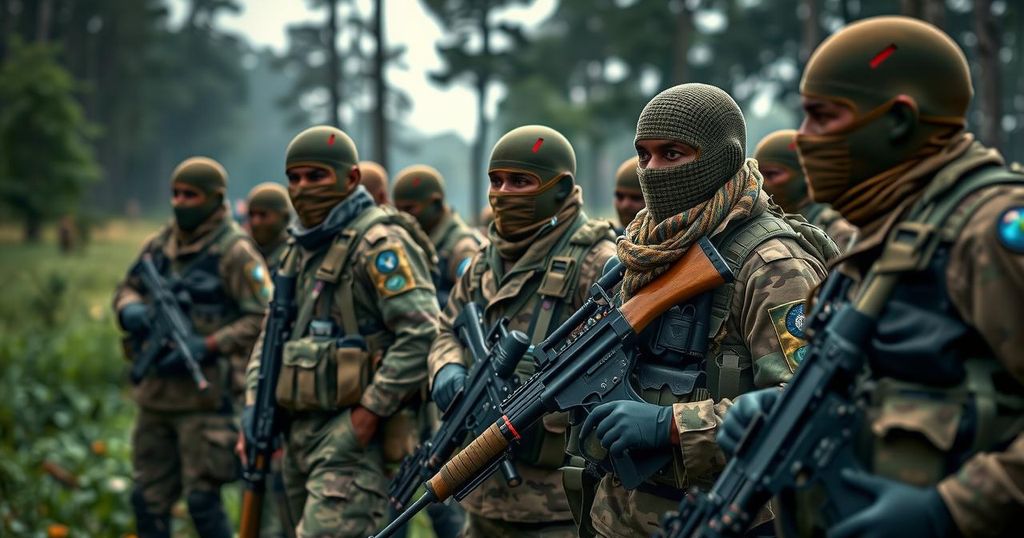The Rwandan-backed M23 rebel group in eastern DRC is primarily perceived as attempting to seize control over mineral resources. Yet, an in-depth study reveals its broader strategy focused on local governance domination, historical land disputes, and economic control through a taxation regime. The conflict’s roots trace back to colonial land appropriation, ethnic tensions, and the militarization of local governance, necessitating a complex approach to conflict resolution that incorporates historical grievances and community dialogue for sustainable peace in North Kivu.
The M23 rebel group, supported by Rwanda, is often viewed merely as a faction attempting to gain control over mineral-rich areas in eastern Democratic Republic of Congo (DRC). While the group has made significant territorial advances since its latest offensive launched in 2021, particularly surrounding Goma in North Kivu province, reducing the conflict solely to a struggle over mining operations fails to capture the complexities involved. An interdisciplinary team of researchers, including collaboration with local civil society organizations, undertook thorough field research, conducting interviews with more than 55 individuals in North Kivu, including members of M23, military personnel, local authorities, and community members. The evidence gathered suggests that M23’s ambitions extend beyond mere mineral control, seeking to fundamentally reshape local governance systems by undermining existing authorities, asserting monopoly over trade routes, and imposing a taxation regime that brings them significant economic power. The historical context further underscores the depth of the conflict: the struggle over land access has deep roots, stemming back to colonial practices in the early 20th century when Rwandan migrants settled in North Kivu, impacting community dynamics. Subsequent tensions have seen Rwandophones pitted against indigenous groups over land rights, which have often escalated into violent confrontations facilitated by various armed factions. The establishment of M23 has not merely coincided with these historical grievances but has emerged as a response to the perceptions and realities of land ownership and authority in the region. Local views capture this complex scenario, revealing that while many Tutsis have not actively sought M23’s protection, the group’s role has become synonymous with advocacy for land rights amid historical injustices. With customary chiefs pivotal in local governance, M23’s attempts to displace these traditional authorities reflect its desire for control over local decision-making processes. The group’s systemic establishment of tax regimes further strengthens their grip on the population and resources. Consequently, local governance structures have become militarized, significantly complicating existing political landscapes. M23’s influence extends to broader regional dynamics as well, with strategic routes allowing revenue generation through trade in minerals. This interplay of local and international interests positions M23 as a critical player in the informal economies of both Rwanda and Uganda, which heightens regional tensions and competition over Congolese resources. Amidst this multifaceted conflict, a nuanced understanding is vital. Sustainable peace will require not only addressing M23’s immediate military threat but also engaging deeply with historical land issues, local governance systems, and community relations. Only through prolonged dialogue and the rebuilding of customary authority can lasting stability and peace be achieved in North Kivu.
The M23 conflict in eastern Democratic Republic of Congo is frequently viewed through a lens focusing on mineral wealth and territorial control. However, such a narrow perspective overlooks the entrenched historical and social dynamics that contribute to the ongoing violence. The complexities surrounding land rights, ethnic tensions, and local governance play a critical role in understanding the motivations and strategies of the M23 rebel group, which has received support from neighboring Rwanda. This conflict has deep historical roots which were shaped during the colonial period and continue to impact current societal relations.
In conclusion, while the M23 rebel group’s actions might appear solely motivated by a desire for control over eastern DRC’s mineral wealth, a comprehensive analysis reveals deeper objectives rooted in local governance and historical land struggles. The implementation of robust conflict resolution strategies that acknowledge these complexities, alongside fostering community engagement and rebuilding trust in local authority structures, will be essential for promoting sustainable peace in the region. Without addressing the underlying issues of land access and governance, any resolution to the conflict is likely to be superficial and temporary.
Original Source: www.defenceweb.co.za






